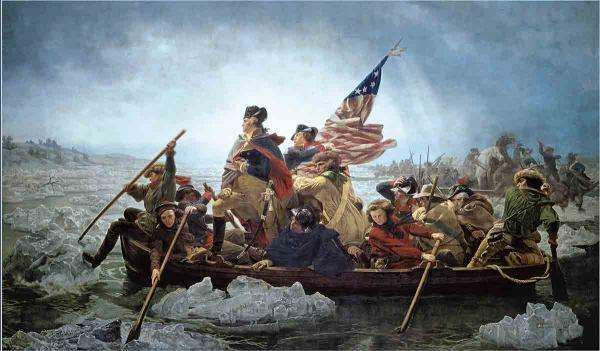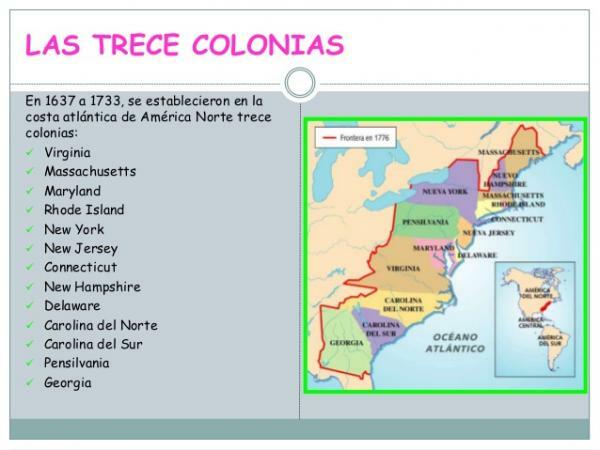The MOST important characters of the independence of the 13 colonies

In all war conflicts there are a series of characters whose function is vital to the future of the war. These characters may belong to the winning side, to the loser, or even change between one and the other during the war, but what they all have in common is that their participation greatly affects the events of the conflict. To meet the protagonists of one of the most famous events in history, in this lesson from a PROFESSOR we are going to talk about important figures of the independence of the 13 colonies.
In all wars there are two sides and in this one the War of the 13 colonies that was no exception. We can divide the participants in the independence of the 13 colonies into two groups, the Thirteen Colonies (later called the United States) and its allies and the British Empire, realistic and allies.
Who were the Thirteen Colonies
The Thirteen Colonies were a group of 13 British colonies who took up arms against the British Empire seeking their independence. During its first years, its way of managing itself was somewhat confusing, not having a fixed government that will manage the group. Starting in 1776, the Thirteen Colonies were renamed the United States, through the Declaration of Independence of the United States.
The Thirteen Colonies too received outside help, being supported by other states that had interests in the British defeat. Both Spain and France supported the Americans in their quest for independence, this was due to that both European countries wanted to achieve greater power in the American continent, and reduce the British. Years later, other regions joined the American campaign, such as the Netherlands and the Republic of Vermont.
Side of the British Empire in the War of the 13 Colonies
The other side was the one formed by the British Empire and the royalists. The first were the British sent by the King of England, fighting in the war to stop their independence. On the other side were the royalists, who were the american settlers who remained loyal to the Empire, and did not fight for independence.
The British army was very large, and that is why it did not need the help of too many allies. His main European ally was the Hanover Electorate, being a state of the Holy German Empire, although they were also joined by a large number of German mercenaries from different states of the Holy German Empire.
An exceptional case was that of Native American Indians, of which many remained neutral, while other tribes joined either side depending on many different factors.

Image: Slideshare
We begin by knowing the important characters of the independence of the 13 colonies from the side of the 13 colonies. Here we can find a great variety of important characters, some of them being the Founding Fathers of the United States, important military leaders of the revolution, or even generals of the allied countries. Some of the main characters of the independence of the 13 colonies are the following:
George Washington
Possibly the most important character of the war, being one of the Founding Fathers of the United States, the first president of the United States, and known as Father of the Nation. His role during the war was vital, as he was the commander in chief of the continental army of the 13 colonies. Washington participated in the writing of the Constitution, and was declared president with a total voter support, being one of the most important people in the history of the States United.
Benjamin Franklin
Another of the Founding Fathers of the United States, and one of the most recognized in the United States. In addition to being a politician, Franklin was also an inventor, creating things like the lightning rod or the odometer. Franklin did not fight in the war, but his role for independence was vital, helping in the drafting the Declaration of Independence, and getting the support of great powers international
John adams
John Adams was one of the Founding Fathers of the United States, being the first American vice president and the second president of the country. His role was more political than military, greatly influencing the 13 colonies to seek independence. Among his main achievements is participating in the Declaration of Independence of the United States, negotiate peace treaties with the UK after the war, and elect George Washington as leader military.
Alexander Hamilton
One of the Founding Fathers of the United States, and creator of the American financial system. Hamilton participated in the war, but his role was never that important in the military aspect, being someone much more relevant in post-war politics and economics.
Thomas jefferson
The third president of the United States and another of the Founding Fathers. He is considered the main creator of the Declaration of Independence, and one of the people who most influenced his enlightened ideas in the formation of the new state.
Benedict arnold
One of the most controversial figures of the war, since he started the conflict on the side of the 13 colonies, to later switch to the side of the Empire. He is considered one of the great traitors of the war, although until his change of sides he was one of the most important American military men.
Marquis de La Fayette
One of the generals sent by France to help the 13 colonies in their independence. He was one of the military with the most victories in the war, considering that without his help the victory of the United States would have been impossible. After the war he befriended George Washington, and participated in the French Revolution.

Image: Prezi
To conclude this lesson on the important figures of the independence of the 13 colonies, we must comment on the protagonists of the British side. On this side we find politicians, soldiers and even figures of the native Indians.
John burgoyne
He was an important British serviceman who was assigned the task of attack the 13 colonies from Canada. His defeat at Saratoga is considered the first great American victory, being the moment in which the European countries realized that the 13 colonies could win the war.
William Howe
He was one of the commanders-in-chief of the British Army during the American War of Independence. His from him were some of the greatest victories of the British side, such as the taking of Philadelphia and New York.
Lord North
He was in charge of sending the British troops during much of the conflict. He is most responsible for the pre-war tax hike, so in part he is the Great responsible for the beginning of the independence of the 13 colonies.
George germain
He was the Secretary of state in the colonies during Lord North's mandate. The disastrous economic management of him, and the bad military elections, have turned him into one of the great marks of the English defeat in the war.
Thomas gage
He was the first commander-in-chief of British troops during the start of the war. He is considered one of the great causes of the beginning of independence, due to his handling of the situation in Massachusetts.
Joseph Brant
Also called Thayendanegea, he was one of the leaders of the mohawks who fought alongside the English. His union with the Empire caused the rupture of the Iroquois confederation, which caused that some of the member tribes were united to the Americans, and others to the British.

Image: aion.mx
If you want to read more articles similar to Important figures of the independence of the 13 colonies, we recommend that you enter our category of Story.
